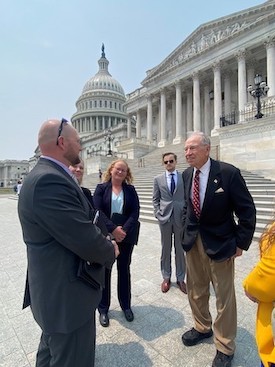By Peter Vitaliano, Chief Economist, NMPF
 The price and margin outlook continues to challenge the nation’s dairy farmers, with little sign of immediate relief.
The price and margin outlook continues to challenge the nation’s dairy farmers, with little sign of immediate relief.
CME futures markets, which I use to project prices, indicate a 2023 calendar year U.S. average All-Milk price within a penny or two of $20.45 per hundredweight (cwt.); combined with an annual average Dairy Margin Coverage (DMC) feed cost of $14.20 per cwt., prices and costs at these levels would result in an annual average DMC margin of $6.25.
The USDA’s DMC Decision Tool has a different take on the CME futures, but it too shows roughly the same three average numbers for this year. Meanwhile, USDA’s World Agricultural Supply and Demand Estimates (WASDE) report from June 8 was even more dour, with a $19.95 per cwt. milk price forecast for this year.
The worst of the trough
And those are just the averages — the worst of the trough may be happening right now. Both the CME futures markets and the USDA tool indicate DMC margins well below $5 per cwt. for the three months during the May to August period, which for the first time would trigger Tier 2 payments. Tier 2 coverage at that level costs only a half cent a hundredweight, the same as equivalent Tier 1 coverage. Neither forecast expects the margin to top $9.50 per cwt. before the year is out.
Milk production isn’t usually cited as the root cause of this gloom – but it deserves a closer look. Production growth has been experiencing an unusually short and mild expansion cycle following its extended period last year below year-earlier levels. Production growth maxed out this year at 1.4% in January and was headed down since, hitting just 0.4% over a year ago in April, but annual growth ticked back up to 0.6% in May and has averaged 0.8% for the first five months of 2023.
But assessing the role of milk production with respect to milk prices can’t be done only with reference to historic patterns but rather with respect to current available demand. USDA reports of plentiful supplies for manufacturing, milk selling well below class prices, and busy production schedules suggests that milk production is definitely part of the problem. And production itself needs to be understood, because milk solids production is a more reliable indicator of the aggregate supply of dairy products available in the markets. And that’s up by 1.1% during the first third of the year.
A top-level look at the supply-demand situation for key products and total milk use during the first third of 2023 provides further insights. American cheese production has been an important outlet for recent additional milk production, which isn’t surprising given the recent expansion of U.S. cheese production capacity. Production has grown by 2.6% during the first four months of this year while total commercial use, domestic consumption, and exports are up by 1.6%. Even with these increases, stocks are still below last year’s peak levels.
Total commercial use of other than American-type cheese is up by just 0.8%, as food service use is weak following more than a year of retail price inflation that has forced consumers to tighten up on spending. But production of this type of cheese is down by half a percent. Total fluid milk sales are 2.7% lower than last year, which is in line with long-term trends that were broken in recent years only during the first pandemic year when fluid sales experienced modest growth. Butter consumption suffered last year from its extreme price inflation but has showed improved consumption in recent months. Total exports are on par with last year’s record levels so far in 2023 but have recently slowed in pace. During March and April last year, exports sent 18.4% of domestic milk solids production overseas. This year, this was just 17%.
The current weak price and margin situation isn’t attributable to one single factor; rather, it’s an accumulation of many small weaknesses in many areas, with some further deterioration in just the last couple of months. The futures markets’ projected improvement during the second half of the year will need to be driven by consumers returning to bolder spending behavior as inflation continues to ebb, and for the current low prices to perform their proverbial supply-side function of curing themselves.


 The price and margin outlook continues to challenge the nation’s dairy farmers, with little sign of immediate relief.
The price and margin outlook continues to challenge the nation’s dairy farmers, with little sign of immediate relief. Farm bill negotiations, an effort to modernize the Federal Milk Marketing Order system, and an ongoing dairy labeling battle provided up-and-coming dairy leaders with no shortage of topics to discuss with members of Congress and their staffs on Capitol Hill.
Farm bill negotiations, an effort to modernize the Federal Milk Marketing Order system, and an ongoing dairy labeling battle provided up-and-coming dairy leaders with no shortage of topics to discuss with members of Congress and their staffs on Capitol Hill. The program’s webinar series is open to all eligible dairy farmers and industry affiliates and available at no cost. The 45-minute webinars, each covering a different topic, are held quarterly. Recent topics include an update on NMPF’s modernization efforts, finding work/life balance on the farm, and a panel discussion about challenges women face in reaching dairy leadership positions.
The program’s webinar series is open to all eligible dairy farmers and industry affiliates and available at no cost. The 45-minute webinars, each covering a different topic, are held quarterly. Recent topics include an update on NMPF’s modernization efforts, finding work/life balance on the farm, and a panel discussion about challenges women face in reaching dairy leadership positions.



